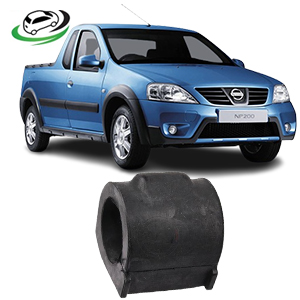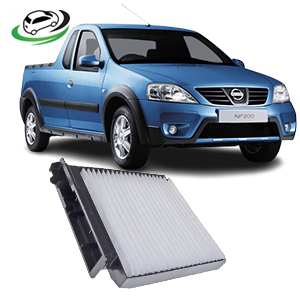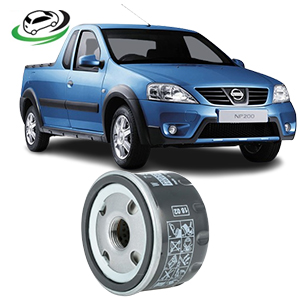-7%
Get Nissan Pick Up NP200 Oil Filter Assy 77 11 945 897
The oil filter assembly is a crucial component of a vehicle’s lubrication system, responsible for maintaining the cleanliness and efficiency of engine oil. By removing contaminants and impurities, the oil filter plays a vital role in ensuring that the engine runs smoothly and efficiently. Understanding its structure, function, types, importance, maintenance, and signs of failure can help vehicle owners appreciate its role in engine health and longevity.
Structure of the Oil Filter Assembly
The oil filter assembly consists of several key components that work together to filter out impurities from engine oil:
- Filter Housing: The outer casing of the oil filter, usually made of metal or high-quality plastic, provides protection and structural integrity. The housing is designed to withstand the pressures and temperatures within the engine.
- Filter Element: This is the core of the oil filter, typically made from pleated paper, synthetic fibers, or other filtration materials. The filter element captures contaminants, dirt, and debris as oil flows through it.
- End Caps: These are attached to the ends of the filter element and are usually made from metal or plastic. The end caps help to maintain the shape of the filter and secure the filter media in place.
- Bypass Valve: Located within the oil filter assembly, the bypass valve allows oil to bypass the filter element if it becomes clogged or if the oil temperature is too low. This ensures that the engine continues to receive oil, albeit unfiltered, preventing potential damage.
- Anti-Drain Back Valve: This valve prevents oil from draining back into the sump when the engine is turned off, ensuring that oil remains in the filter and is available for immediate circulation upon startup.
- Sealing Gasket: This rubber or silicone gasket is located on the oil filter’s mounting surface. It ensures a leak-proof seal between the filter and the engine block when the filter is installed.
Function of the Oil Filter Assembly
The primary function of the oil filter assembly is to remove contaminants from engine oil. Its key functions include:
- Contaminant Removal: The oil filter captures dirt, metal particles, soot, and other impurities that accumulate in the oil over time. This helps to maintain the oil’s cleanliness and ensures proper engine lubrication.
- Improving Engine Efficiency: Clean oil reduces friction between moving parts, allowing the engine to operate more efficiently. This can lead to better fuel economy and improved overall performance.
- Extending Engine Life: By filtering out harmful contaminants, the oil filter helps protect critical engine components from wear and damage. This contributes to a longer engine lifespan and reduces the likelihood of costly repairs.
- Maintaining Oil Pressure: The oil filter helps maintain consistent oil pressure by preventing blockages and ensuring that oil flows freely through the engine. Proper oil pressure is crucial for optimal engine performance.
- Preventing Sludge Build-Up: By removing particles and contaminants, the oil filter helps prevent sludge formation within the engine, which can lead to decreased performance and potential engine failure.
Types of Oil Filters
There are several types of oil filters available, each designed for specific applications and performance levels:
- Full-Flow Oil Filters: The most common type found in modern vehicles. Full-flow filters allow all the engine oil to pass through the filter before reaching critical engine components, ensuring that all oil is filtered.
- Bypass Oil Filters: These filters only filter a portion of the oil circulating through the engine, allowing the rest to bypass the filter. While they are less common, they can be used in applications where high levels of filtration are required.
- Cartridge Oil Filters: This type features a replaceable filter element housed within a permanent metal casing. Cartridge filters are popular in many modern vehicles due to their ease of replacement and lower environmental impact.
- Spin-On Oil Filters: These are pre-assembled filters that include the filter media, housing, and sealing gasket in one unit. They are easy to install and commonly used in various vehicles.
- Magnetic Oil Filters: These filters use magnets to attract and capture metal particles in the oil, providing an additional layer of filtration. While not standard in all vehicles, they can be beneficial for certain applications.
- High-Efficiency Filters: Designed for high-performance engines, these filters feature advanced filtration media that can capture smaller particles, providing superior protection for high-stress applications.
Importance of Oil Filters
The oil filter assembly is vital for several reasons:
- Ensuring Engine Longevity: By removing harmful contaminants, the oil filter helps protect critical engine components, extending the life of the engine and reducing the need for repairs.
- Enhancing Performance: Clean oil improves engine efficiency, resulting in better fuel economy and performance. This is especially important for high-performance vehicles that operate under demanding conditions.
- Preventing Engine Damage: Contaminated oil can lead to increased wear on engine components, potentially resulting in severe damage. The oil filter plays a crucial role in preventing such issues.
- Maintaining Oil Quality: Regular oil changes and filter replacements help maintain the overall quality of the engine oil, ensuring it performs effectively throughout its service interval.
- Environmental Protection: By preventing oil leaks and maintaining oil quality, the oil filter assembly contributes to a cleaner environment. Properly maintained vehicles produce fewer emissions and reduce the risk of oil spills.
Maintenance of Oil Filters
Regular maintenance of the oil filter is essential for optimal engine performance:
- Regular Oil Changes: Follow the manufacturer’s recommended oil change intervals, which typically include changing the oil filter. Regular oil changes help ensure that the oil remains clean and effective.
- Visual Inspections: Periodically inspect the oil filter for signs of leaks, damage, or contamination. Any visible issues should be addressed immediately to prevent potential engine damage.
- Choose Quality Filters: Always use high-quality oil filters that meet or exceed manufacturer specifications. Cheap or subpar filters can lead to insufficient filtration and may not provide adequate protection for the engine.
- Monitor Oil Condition: Keep an eye on the condition of the engine oil. Dark, thick, or contaminated oil can indicate that the filter is clogged or that the oil change interval has been exceeded.
- Check for Bypass Valve Activation: If the engine oil bypass valve is frequently activated, it may indicate that the filter is clogged and needs replacement. Regular monitoring can help prevent this issue.
Symptoms of Failing Oil Filters
Several signs can indicate that the oil filter is failing or needs replacement:
- Low Oil Pressure Warning Light: If the oil pressure warning light activates, it may indicate a clogged filter, restricting oil flow to the engine. This requires immediate attention.
- Engine Noise: Unusual noises, such as knocking or ticking sounds, can indicate insufficient oil circulation due to a clogged oil filter. This can lead to serious engine damage if not addressed.
- Oil Leaks: Visible oil leaks around the oil filter area can indicate a failed sealing gasket or a damaged filter. This should be addressed promptly to prevent oil loss and engine damage.
- Dirty Oil: If the engine oil appears dark, thick, or gritty, it may indicate that the oil filter is not effectively capturing contaminants. This can compromise engine performance and longevity.
- Unusual Exhaust Smoke: Excessive smoke from the exhaust can indicate oil burning, which may be caused by oil leaking into the combustion chamber due to a failing oil filter or other issues.
Conclusion
The oil filter assembly is a critical component of a vehicle’s lubrication system, playing a vital role in maintaining engine health and performance. By filtering contaminants from the engine oil, the oil filter helps ensure efficient operation, prolongs engine life, and enhances overall vehicle performance. Regular maintenance, timely replacement of worn filters, and attentiveness to potential failure symptoms are essential for optimal engine function. Understanding the importance of the oil filter empowers vehicle owners to make informed decisions about their vehicle’s maintenance, ensuring a smooth and reliable driving experience.
Follow us on Facebook for more parts.



